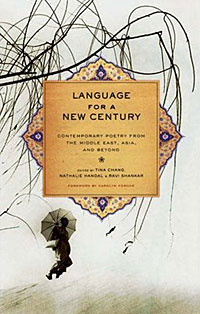 |
Language for a New Century: contemporary poetry from the Middle East, Asia and beyond, a Norton anthology edited by the poets Tina Chang, Nathalie Handal and Ravi Shankar, presents over 400 poets from 61 countries. These include eight from Nepal: Mohan Koirala, Bhupi Sherchan, Banira Giri, Poorna Vaidya, Manju Kanchuli, Manjul, Bimal Nibha and Toya Gurung. The 700-page book is organised thematically, with the editors identifying nine categories of poems. While reading, I chafed against the limits these categories set, believing that poems are surely multi-themed, and often instead of following the writer in her concerns and creativity, her emotive power and idiomatic awareness, I found myself asking as I read � where is this poet from?
The phrase 'Parsed Into Colors' from Vaidya's poem 'What Water Is' precedes the second section of the book, as indicative of the theme of identity. But for Vaidya the focus may have been consciousness and vision. Nibha's 'The Cycle' is tagged here as a poem that "uses a lost bicycle as a metaphor for the rediscovery of a new interiority". Can't a bicycle just be a bicycle and someone who uses and needs it, despite its pitiable state, feel its loss, a loss that tells us much about the conditions where he lives? And what of the aside, when Nibha moves from description to thought? "What kind of place is this/ �where in the bright light of midday/ a whole life has vanished". Readers coming to this simply stated poem might realise its social implications, and after years of civil strife might take the leap and read "a whole life has vanished" explicitly. Half the poets from Nepal are identified as poets of individuality. Does this reflect the editors' reading rather than the poet's intent as seen within the body of their work or by readers in their own country?
Regardless of how the poems are presented, anyone who engages this provocative collection will be rewarded by its range and diversity and will be, as I have, seduced, confounded, disturbed, entertained, kicked in the gut and called to action and compassion by the many languages of this new century.
The Country Is Yours � contemporary Nepali literature presents 49 writers and poets whose work appeared, according to the translator Manjushree Thapa, before and after "the reestablishment of democracy in 1990, a period of unprecedented free expression in Nepal." Familiar with the Norton format, Thapa organises this collection thematically. Here, within a shared, recognisable history, themes make sense and the short fiction interspersed throughout gives the collection an added depth, leaving the reader with the recognition that it is not only the quality of the writing but the insight into the country that matters.
Whose City Is This? (Yo Sahar Kosko Ho?) comprises Nepali poems in a bilingual edition sponsored by GTZ and Siddhartha Art Gallery. It uses Ulrich Treichel's 'Whose City Is This?', written after the fall of the Berlin Wall, as a catalyst. Twenty-seven poets appear in Nepali (and Nepal Bhasa) and in translation. Poems by Rajan Murkarang, 'City Of Dreams'; Bhupal Rai, 'This City Till Yesterday'; and Swo Swapnil Smriti, 'Red Brick Jungle' stand out for their powerful voice, perceptive observations and intensity of language. In this collection a single question and example brings forth a range of language, emotion and intent, and a penetrating expression of what it is like to live in Kathmandu.
These two books from Nepal are bound by insights from a common undertaking or a shared history and circumstance. The three poems by Bimal Nibha in The Country Is Yours inform each other, as does the work that surrounds them. Individuality and social concern resonate through the language used. Their strengths, like many of the poems in all three collections, are manifold, and no single reading or theme lays claim to their meaning. Failing to first read poetry in its own setting, however, with the author's intent in mind, unmoors the creative mind. The understanding that follows will partake more of air than earth and the insight that flickers there will burn fast and be rootless.
Language for a New Century, edited by Tina Chang, Nathalie Handal and Ravi Shankar
The Country Is Yours, translated by Manjushree Thapa
Whose City Is This?, translated by Sajag Rana et al
READ ALSO:
On the eighth note, PAAVAN MATHEMA
Men behaving badly, FIONA LEDGER


